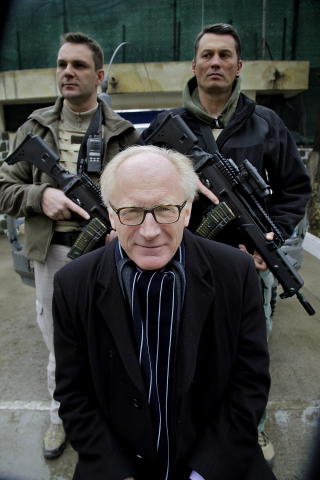Norwegian PEN and other PEN centers had been working actively with other global freedom of expression organizations and Norwegian and Swedish politicians, in order to get Kambakhsh out of prison and out of Afghanistan, when the news of his release was made public in early
September 2009.
 However, details about his release and subsequent flight from Afghanistan have been kept secret for security reasons. Now that Kambakhsh is safe, Mr. Eide tells his dramatic story to the Norwegian media.
However, details about his release and subsequent flight from Afghanistan have been kept secret for security reasons. Now that Kambakhsh is safe, Mr. Eide tells his dramatic story to the Norwegian media.
The UN’s special representative in Afghanistan Kai Eide was well familiar with the Kambakhsh case prior to his engagement as the UN special representative in Afghanistan.
In September 2008 he started working actively in order to get him released. In April this year, Eide made an attempt to get Kambakhsh out of the country, but failed. However, on August 20, only a few weeks prior to the presidential elections, there was an opening and Kambakhsh was released from jail and placed in Mr. Eide’s custody.
“This happened very close to the elections and I was very nervous  about the process of getting him out of the country,” says Eide, right, to Dagbladet.
about the process of getting him out of the country,” says Eide, right, to Dagbladet.
Total secrecy was essential. The only ones informed about the case at this point, were Eide’s closest advisors.
Kambakhsh remained in Mr. Eide’s custody for more than two weeks during the ongoing presidential elections. Eide’s main worry now was how to get Kambakhsh out of Afghanistan. Getting a visa to any European country was difficult and Eide visited several embassies, but with no luck. Eventually, a passport with a visa to Norway was obtained.
Kambakhsh’s golden opportunity to get out of Afghanistan happened suddenly when the Swedish Minister of Foreign Affairs, Mr. Carl Bildt, arrived in Kabul on the Swedish government’s private jet.
Eide contacted Bildt on the morning of his return to Sweden, asking him if Kambakhsh could join him on the flight to Stockholm. The answer was an immediate yes and one of Eide’s advisors joined Bildt and Kambakhsh on the plane to Stockholm.
Kambakhsh then travelled by car to Oslo where he stayed for one week.
During his week in Oslo, Kambakhsh also met and had dinner with Elisabeth Eide and Anders Heger, President of Norwegian PEN. He also met with the Norwegian Minister of Foreign Affairs, Jonas Gahr Støre, who has supported his case for a long time.
Kai Eide tells Dagbladet that “Kambakhsh did not relax until he arrived in Oslo. Staying with me in Kabul was also like being in jail, albeit a
better one. He lived in constant fear that something should go wrong and that he would be sent back to jail (. . .). When we went for a walk in the streets of Oslo, Kambakhsh jokingly said that this was probably the only place we can both walk freely and without guards.”
 The Dagbladet article credits the work of Norwegian PEN and its Vice
The Dagbladet article credits the work of Norwegian PEN and its Vice
President, Elisabeth Eide, left. Norwegian PEN worked closely with Danish PEN and other PEN centers, as well as with Danish and Norwegian Journalists’ Associations.
A delegation from Norwegian PEN and Index on Censorship visited Kabul in May of this year, meeting with Kai Eide, Kambakhsh’s relatives and his lawyer.
In cooperation with the International Federation of Journalists and International PEN’s Emergency Fund, money was also raised for Kambakhsh’s defence and for the continuous work of the famous writer Dr. Samay Hamed, who was instrumental in moving the case forward by using pressure on the Afghan government and president Karzai. Due to his efforts, petitions were mobilized for Kambakhsh’ release in more than 20 provinces of Afghanistan last year.
The young journalist Sayed Pervez Kambakhsh was sentenced to death in December 2007 for blasphemy. His crime was that he had downloaded a report criticising the treatment of women under Islamic law. The trial was held behind closed doors and without a lawyer representing Kambakhsh.
The Afghan senate confirmed the death sentence in a statement in January 2008, but the statement was later withdrawn. In October 2008 an appeals court cancelled the death sentence. Instead, Kambakhsh was sentenced to 20 years in jail.
Kambakhsh’s current place of residence cannot be disclosed for security reasons.


